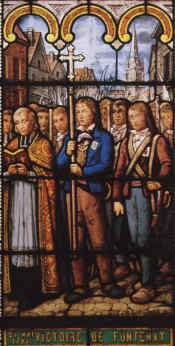Second Battle of Fontenay-le-Comte
| Battles of Fontenay-le-Comte | |||||||
|---|---|---|---|---|---|---|---|
| Part of the War in the Vendée | |||||||
 Stained glass window in the Saint Pauvin Church in Le Pin-en-Mauges commemorating the battle(s). |
|||||||
|
|||||||
| Belligerents | |||||||
| French Republic | Royalists | ||||||
| Commanders and leaders | |||||||
| Alexis Chalbos |
Charles de Bonchamps Marquis de Lescure |
||||||
| Strength | |||||||
| 14,000 | 35,000 | ||||||
| Casualties and losses | |||||||
| 4,000, 40 cannons lost |
1,000 | ||||||
The Battles of Fontenay-le-Comte were fought on 16 May 1793 and on 25 May 1793 during the French Revolutionary Wars, between forces of the French Republic under Alexis Chalbos and Royalist forces under Marquis de Lescure and Charles de Bonchamps. The battle was fought near the town of Fontenay-le-Comte in Vendée, France, and ended in a Royalist victory. The first battle resulted in the town's successful resistance to the insurgent army; the second battle resulted in the Vendean victory.
In 1791, two representatives on mission informed the National Convention of the disquieting condition of Vendée, and this news was quickly followed by the exposure of a royalist plot organized by the Marquis de la Rouerie. It was not until the social unrest combined with the external pressures from the Civil Constitution of the Clergy (1790) and the introduction of a levy of 300,000 on the whole of France, decreed by the National Convention in February 1793, that the region erupted.
The Civil Constitution of the Clergy required all clerics to swear allegiance to it and, by extension, to the increasingly anti-clerical National Constituent Assembly. All but seven of the 160 French bishops refused the oath, as did about half of the parish priests. Persecution of the clergy and of the faithful was the first trigger of the rebellion. Nonjuring priests had been exiled or imprisoned. Women on their way to Mass were beaten in the streets. Religious orders had been suppressed and Church property, confiscated. On 3 March 1793, virtually all the churches were ordered closed. Soldiers confiscated sacramental vessels and the people were forbidden to place crosses on graves.
...
Wikipedia
